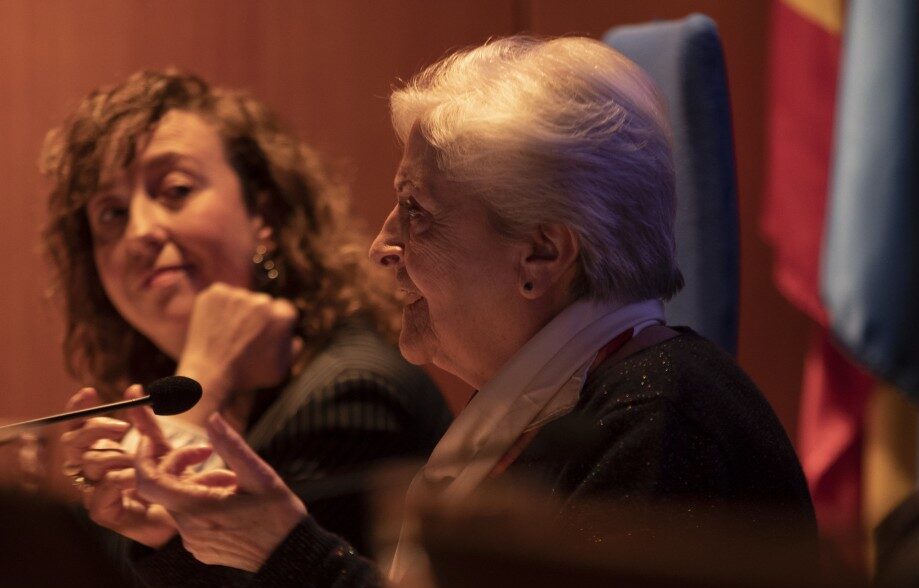Nearly half a century later, the 1980 Hague treaty’s rapporteur on international child abduction, Elisa Pérez-Vera, spoke to the Uruguayan newspaper la diaria about the urgent need for domestic violence to be recognised in its procedures: “If I had to draft it today, I would think about it”.
by Patrícia Álvares for la diaria* – February 10, 2024
That was back in the 1970s when Spanish jurist Elisa Pérez-Vera became the first woman rapporteur of a private international law treaty at the Hague Conference on Private International Law (HCCH). Those were years of effervescent progress for women, especially in economic and reproductive matters.
Choosing when or whether to have children, working out of home and generating their own income settled the agenda priority of those days: autonomy. Much was discussed about discrimination, not violence though, as reflected in the Convention on the Elimination of Discrimination against Women (CEDAW), signed in 1979, and considered a framework for women’s human rights.
In the same context, the 1980 Hague Convention was born, with Pérez-Vera participating in its drafting.
“Gender-based violence was not taken into account,” she lamented, in the interview with la diaria. “We had not become aware that it was a phenomenon,” she added.
And so it was when, in 1981, as rapporteur of the treaty, she wrote the official explanatory report on international child abduction.

Being the first female rapporteur of an HCCH convention was a milestone, although perhaps a minor detail in her career. “Thank you for remembering me,” Pérez-Vera began on the subject. That’s because her name resonates rather due to other feats, for which she is actually used to talking to the press.
In 1982, the Granada-born lady made history by becoming the first woman rector of a university in Spain, the National University of Distance Education (UNED). “It was unusual for a woman to claim it,” she eventually declared.
In her honour, UNED offers annual awards that bear her name and recognize academic works on gender, women and feminism, with 26 editions already. There is more. For a whole decade, the first one of this century, Elisa was part of Spain’s Constitutional Court, the highest court in the country. She was one of only two women among 12 judges.
The gender perspective came later. She insists that she did not feel discriminated against while breaking glass ceilings. Her mindset changed over time as she watched around, she revealed during the interview. Now, for example, Pérez-Vera observes how the Hague Convention which she helped draft fails to protect children if it does not take into account the violence suffered by mothers.
The Convention today
In more than half of the world, year after year, nearly 2,000 migrant women are accused of abducting their own children. This is a global phenomenon from the 21st century, as la diaria has previously reported, with stories of binational families trapped between the 1980 Hague Convention and a human rights limbo.
Maria’s case is illustrative. To those who may not be familiar with it, the journey of the Uruguayan mother to stay and live in her native country with her dual citizenship daughter motivated the campaign “María no se va” (María will not leave) and touched Uruguay in 2019. There was no way. Maria fell under the Hague Convention for her child’s international abduction.
The girl, then seven years old, was forced to return to Spain at the request of her Spanish father, despite the evidence of abuse she suffered at his hands. Back in Barcelona, mother and daughter were separated in tears. Similar results are taking place in both hemispheres.
Foreign mothers like Maria make up 75% of international child abduction cases. That’s more than triple the rate of male parents, who account for 23%, according to the fifth and latest HCCH data. The gender gap has triggered warnings of biases and risks in the Hague Convention’s applicability.
The contravention today
From the United Nations, for example, three rapporteurs have denounced that the 1980 treaty currently violates women and children victims of domestic violence, forcing them to live with their abusers and contravening fundamental human rights obligations to be protected by its state parties. The situation has been deemed “inadmissible” in a joint letter sent to the HCCH in 2023.
The treaty’s eighth review meeting, last October, concluded with an stated intention to discuss the issue with representatives of affected mothers and minors. The HCCH, however, advocates speeding up the Convention procedures in signatory territories, which hinders allegations of violence in international child abduction prosecutions.
Another statistic also calls into question the purpose of the 1980 Hague Convention, which has been in force in 103 countries to date (and counting). Ninety-four per cent of abducting mothers are primary caregivers with guardianship of their children. The treaty’s authors did not foresee the current landscape, au contraire of when its text was conceived, Pérez-Vera stressed.
“The social reality to which we tried to respond was one of kidnappers, mostly males, who were not also holders of custody rights, and who took children away from their mothers,” she recalled. In her opinion, “it’s time to try to reinterpret the Convention in such a way that it continues to meet its main objective”, that of protecting children who are “victims of disagreements between adults”.
The interview
la diaria: A lot has been discussed on whether the 1980 Hague Convention has become obsolete in the face of changes in our 21st-century society. Studies on the language and context in which it was drafted in the 1970s indicate its focus on male abducting parents at the time, compromising its effect today. Is that correct?
Elisa Pérez-Vera: Yes, indeed. It is very clear to me that the time has come to try to reinterpret the Convention in such a way that it continues to meet its main objective. When we drafted the Convention, we wanted to create an eminently practical cooperation between authorities to protect minors who are victims, always, then and now, of the disagreement between the adults responsible for their care and guardianship. And I believe that, almost 50 years later, we need to reinterpret the letter of the Convention in light of the new social realities in which it has to be applied. It is true indeed that the social reality to which we tried to respond was one of kidnappers, mostly fathers, who were not also holders of custody rights, and who took children away from their mothers. Now, on the contrary, several decades later, what we have is that most of the abductors are women who have the official rights of guardianship over their children but who are fleeing from an abuser.
I believe that the fundamental element of change that was not taken into account was gender-based violence -it certainly existed but had not been made evident. We had not been aware that it was a phenomenon that was going to have such an impact on the lives of women and minors. So I do believe this is a fact that should make those applying the Convention think about the need to reinterpret the essential idea that those who are best placed to decide who should have the custody and guardianship of the child are the judges of the habitual residence before the displacement, the abduction, takes place. The problem is: if those judges happen to be in the same place where the abuser is, is it reasonable to request that the authority of the country where the mother has taken refuge with the child return both mother and child to the place where the abuser is? Or, on the contrary, can it be understood that such a return would place the child in an intolerable situation within the meaning of the Convention’s Article 13?
That is the question to be resolved and it cannot be resolved in an a priori manner, i.e. without taking into account the circumstances of the case. If I had to write it today, I would think that one of the circumstances that judges can take into account when affirming that there is an exception to the return of the child to the place of habitual residence is precisely the existence of an abuser, of a father who exercises gender violence on the mother, and normally also in a vicarious way, on the abducted child.
ld: The 2020 HCCH guide instructs judges to assess how serious the domestic violence is for a child so as to not be returned to the country of habitual residence. How can judges decide that an abuse is not serious?

EPV: One thing is how a conventional or legislative rule is drafted, and another is how it can be applied in practice. But even if the judge of the country of refuge, where the mother has taken refuge with the child, returns the child to the country of habitual residence, the latter judge will normally –depending on each country’s social services, and socioeconomic conditions– have the means to verify whether there is such violence, whether the mother can be authorised to travel outside the country, or whether some measure of protection can be taken for the mother and the child.
It is not to shake off the responsibility of the drafters. Still, I believe that problems within a law application can only be solved by the judges and courts that are hearing the cases. However, I insist that, from the point of view of interpreting Article 13, domestic violence, gender violence should be a factor to be taken into consideration both by the judges in the State of refuge, who have to decide whether or not to return the child, and by the judge who naturally, according to the Convention, would have to decide on the custody relationship.
ld: An abducting mother was killed by her ex-husband after having to return her children to their country of habitual residence under the Hague Convention. Despite the history of domestic violence in the case, Australian courts had determined that England, a developed country, had sufficient means to protect her. What guarantees are there that protective measures ordered by a judge in another country will be enforced, and how effective can such protection be?
EPV: The death of a person is always relevant. And it shows that no system is perfect. Many times, we jurists find ourselves powerless in the face of a reality in which it is so easy to take another person’s life. No matter how hard you try to establish systems of protection, the truth is that it is extraordinarily difficult to ensure one hundred per cent of a person’s integrity. Even if, let’s imagine that the lady in the example could have stayed in Australia, how guaranteed is that the abuser, the murderer, was not going to follow her to Australia to kill her? I don’t know how we can guarantee the life of a person one hundred per cent. It is terrible, but I think we have to be aware that it is complicated.
ld: According to your 1981 explanatory report, the Convention prevents abductors from having any advantage in their home country to contest their children’s custody. Can it be inferred that Justice is biased in favour of nationals?
EPV: Yes, I think this is unfortunately the case. First of all because… let’s think about countries that have different languages. The foreign spouse has the difficulty of the language, the difficulty of knowing the way of thinking, which seems silly but in these matters, it is very important how a certain reality is perceived. I have read sentences, I remember discussions at the Hague Conference itself in which there was a representative of a Nordic country in a case involving the return of a minor to a Spanish parent, who was the one holding custody and guardianship of the child. The reason given by the judge for not returning the child was that the father owned a bar. To think that a kid is at risk because his father owns a bar is to demonise all bar owners, who are not necessarily alcoholics, who are not necessarily going to expose their children to risk.
Indeed, litigating in one’s own country, before one’s own court, has an extra bonus of advantage over the foreigner. I think xenophobia is latent in many of us, even if we don’t realise it, even if we believe we are not xenophobic, in the end, there is more tendency to believe the national than the foreigner. I think it works at all levels, not only before a judge but also before the police or any institution. Let’s think: the national plays at home. It is like football. Playing at home is always an advantage.
ld: Changing the subject a little bit, at the launching of the book in homage to your work, Ópera selecta, you highlighted some thirty dissenting votes you made during your ten years at the Constitutional Court. What is the dissenting or dissident vote? Why is it important? What role do women judges play in that sense?
EPV: There are courts in which there is the possibility of a dissenting vote and courts in which it is not possible, there is only the voice of the majority. The dissenting vote is the voice of the minority in a court. Many times the court reaches a conclusion with which you do not agree and then you explain the reasons. Dissenting votes are usually more coherent than final sentences themselves, for a clear reason: in the dissident vote, there is a single author who expresses the dissenting opinion in an orderly manner, without having to make concessions, while the sentences, in collegiate bodies, are the result of a debate and an agreement of mutual concessions, for which sometimes they are not so clear. But I have always sought agreement, both at international conferences and in my work at the Constitutional Court, so this is the exception.
Has being a woman influenced me or not? Possibly yes, but it is also true that being a minority in a court -as when I was in the Constitutional Court, we were only two magistrates out of 12, a real minority-, at the level of higher courts, constitutional courts, the reception of your opinion, the opinion of a woman, is not as a woman, it is as a jurist, and we are usually heard. I have not felt discriminated against, I have felt that many times my perception of the problems was very different from the perception of men. It is important to know that many times there is no bad faith in a male interpretation, it is how a part of the population sees it, an important part, but we women are 50% of the world’s population, we have to put on record our way of approaching problems. That is why I would encourage women to continue fighting to reach all positions, including those of national and international justice: they are decisive.
ld: You have also stated that you consider yourself more of a feminist today than when you started breaking down barriers in spaces without women. What has that transformation process been like? Has anything in particular triggered such a reflection for you?
EPV: Nothing particular, the environment. The resistance to change. I found it very normal when I became the first woman rector of a Spanish university, or when I reached the Constitutional Court, and when I was the first woman to write an explanatory report at the Hague Conference because it was the first time there was a woman on the HCCH directive board. The problem is that I have realised that when women advance and win in equality, in non-discrimination, many men react in a way… I don’t know how to say it, but in a way, as if they were being attacked, as if we were taking something away from them for the fact of not wanting to be discriminated against. That is why I feel more feminist now because I am more aware of women’s structural problems we have to reach positions of responsibility.
====
What is international child abduction?
The 1980 Hague Convention’s Article 28 defines international child abduction as “the wrongful removal or retention” of children abroad without the other parent or caretaker’s consent. Broadly speaking, the treaty establishes a bilateral protocol that prompts procedures between signatory countries when one asks the other to locate and return a child to his or her former “habitual residence”.
The Hague Conference on Private International Law (known as HCCH for its bilingual English and French acronym) is the intergovernmental legislative body that has governed this and other conventions since 1893. The HCCH works actively with member states to ensure the effectiveness of the treaty, as well as to expand its scope.
Thus the Hague Convention keeps conquering new territories almost half a century after it was initially signed by four northerners – Canada, France, Greece and Switzerland. Today, it has been particularly spreading to developing countries, Africa’s Botswana and Cape Verde being the newest to join, at the beginning of 2023.
—

